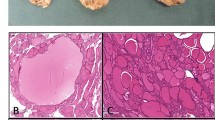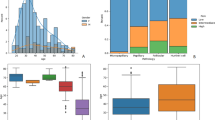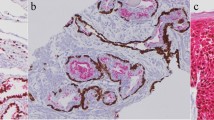Abstract
Introduction
Despite the crucially prognostic value of lymph node metastasis (LNM) in patients with medullary thyroid cancer (MTC), only the LNM compartment alone was reflected in the 8th edition of the American Joint Committee on Cancer (AJCC) system.
Objective
This study aimed to incorporate the metastatic lymph node number and metastatic lymph node ratio to generate a more accurate and appropriate N staging system for patients with MTC based on recursive partitioning analysis.
Design, Setting, and Patients
Two cohorts were included in the analysis, including 1374 MTC patients from the Surveillance, Epidemiology, and End Results database as the derivation cohort, and 164 patients from Fudan University Shanghai Cancer Center as the validation cohort. The predictive performance of the alternative proposed N staging system was compared with that of the 8th AJCC system by using the Harrell concordance index (C-index) and the area under the receiver operating characteristic curve (AUC).
Results
In the derivation cohort, the C-index and the AUC at 10 years were 0.778 and 0.789, respectively, for the novel N staging system, and 0.749 and 0.741, respectively, for the 8th AJCC N staging system. Similar trends were also observed in the validation cohort. The proposed N staging system had a better prognostic performance.
Conclusion
With some improvements, the novel N staging system for MTC suggested from this research may be assessed for potential adoption in the next edition of the AJCC N staging system.


Similar content being viewed by others
References
Siegel RL, Miller KD, Jemal A. Cancer statistics, 2019. CA: A Cancer Journal for Clinicians. 2019;69(1):7-34.
Brose MS, Bible KC, Chow LQM, et al. Management of treatment-related toxicities in advanced medullary thyroid cancer. Cancer Treat Rev. 2018;66:64–3.
Ernani V, Kumar M, Chen AY, Owonikoko TK. Systemic treatment and management approaches for medullary thyroid cancer. Cancer Treat Rev. 2016;50:89–8.
Wells SA Jr, Asa SL, Dralle H, et al. Revised American thyroid association guidelines for the management of medullary thyroid carcinoma. Thyroid. 2015;25(6):567–10.
Castinetti F, Waguespack SG, Machens A, et al. Natural history, treatment, and long-term follow up of patients with multiple endocrine neoplasia type 2B: an international, multicentre, retrospective study. Lancet Diabetes Endocrinol. 2019;7(3):213–20.
Accardo G, Conzo G, Esposito D, et al. Genetics of medullary thyroid cancer: an overview. Int J Surg. 2017;41:S2–S6.
Bae YJ, Schaab M, Kratzsch J. Calcitonin as biomarker for the medullary thyroid carcinoma. In: Raue F (ed). Medullary thyroid carcinoma: biology—management—treatment. Springer, Cham; 2015, pp. 117–137.
Cabanillas ME, Houston MR, Hu MI, et al. Prognostic significance of circulating RET M918T mutated tumor DNA in patients with advanced medullary thyroid carcinoma. J Clin Endocrinol Metab. 2017;102(9):3591–9.
Berg AN, Seethala RR. The American Joint Committee on cancer eighth edition: changes in thyroid carcinoma staging and an update on reporting. AJSP Rev Rep. 2018;23(3):145–8.
Ding N, Pang Z, Zhang X, et al. Prognostic and predictive effects of positive lymph node number or ratio in NSCLC. Sci Rep. 2017;7(1):584.
Kang SI, Kim D-W, Shin E, et al. Clinical significance of lymph node metastasis in the mesentery of the terminal ileum in patients with right-sided colon tumors at different locations. Dis Colon Rectum. 2018;61(6):692–7.
Ho AS, Kim S, Tighiouart M, et al. Metastatic lymph node burden and survival in oral cavity cancer. J Clin Oncol. 2017;35(31):3601–9.
Ho AS, Kim S, Tighiouart M, et al. Association of quantitative metastatic lymph node burden with survival in hypopharyngeal and laryngeal cancer. JAMA Oncol. 2018;4(7):985–9.
Machens A, Lorenz K, Dralle HJE. Histology-proven recurrence in the lateral or central neck after systematic neck dissection for medullary thyroid cancer. Endocrine. 2018;61(3):428–9.
Machens A, Dralle H. Prognostic impact of N staging in 715 medullary thyroid cancer patients: proposal for a revised staging system. Ann Surg. 2013;257(2):323–9.
Adam MA, Pura J, Goffredo P, et al. Presence and number of lymph node metastases are associated with compromised survival for patients younger than age 45 years with papillary thyroid cancer. J Clin Oncol. 2015;33(21):2370–5.
Hothorn T, Hornik K, Zeileis A. Unbiased recursive partitioning: a conditional inference framework. J. Comput. Graph. Stat. 2006;15(3):651–74.
Tuttle RM, Haugen B, Perrier ND. Updated American Joint Committee on cancer/tumor-node-metastasis staging system for differentiated and anaplastic thyroid cancer (eighth edition): what changed and why? Thyroid. 2017;27(6):751–6.
Nixon IJ, Shaha AR. Management of regional nodes in thyroid cancer. Oral Oncology. 2013;49(7):671–5.
Moley JF. Medullary thyroid carcinoma: management of lymph node metastases. J Natl Compr Canc Netw. 2010;8(5):549–56.
Pacini F, Castagna MG, Cipri C, Schlumberger M. Medullary Thyroid Carcinoma. Clin Oncol. 2010;22(6):475–85.
Qian K, Sun W, Guo K, et al. The number and ratio of positive lymph nodes are independent prognostic factors for patients with major salivary gland cancer: results from the surveillance, epidemiology, and end results dataset. Eur J Surg Oncol. 2019;45(6):1025–32.
Tang X, Chen Y, Guo L, Zhang J, Wang C. Prognostic significance of metastatic lymph node number, ratio and station in gastric neuroendocrine carcinoma. J Gastrointest Surg. 2015;19(2):234–41.
Zhou Y-Y, Du X-J, Zhang C-H, et al. Comparison of three lymph node staging schemes for predicting the outcome in patients with small bowel adenocarcinoma: a population-based cohort and international multicentre cohort study. EBioMedicine. 2019;41:276–85.
Randle RW, Balentine CJ, Leverson GE, et al. Trends in the presentation, treatment, and survival of patients with medullary thyroid cancer over the past 30 years. Surgery. 2017;161(1):137–46.
Kuo EJ, Sho S, Li N, Zanocco KA, Yeh MW, Livhits MJ. Risk factors associated with reoperation and disease-specific mortality in patients with medullary thyroid carcinoma. JAMA Surg. 2018;153(1):52–9.
Meng K, Luo H, Chen H, Guo H, Xia W. Prognostic value of numbers of metastatic lymph node in medullary thyroid carcinoma: a population-based study using the SEER 18 database. Medicine (Baltimore). 2019;98(1):e13884.
Tingyin Jiang CH, Yuan X. Ratio of positive lymph nodes: the prognostic value in stage IV thyroid cancer. Oncotarget. 2017;8(45):79462–8.
Acknowledgement
The authors harbor sincere gratitude for the efforts of the SEER program in the establishment of the SEER database.
Funding
This work was supported by the National Natural Science Foundation of China (81772852), and the Science and Technology Commission of Shanghai Municipality (16ZR1406600).
Author information
Authors and Affiliations
Corresponding author
Ethics declarations
Disclosures
Lili Chen, Kai Qian, Kai Guo, Xiaoke Zheng, Wenyu Sun, Tuanqi Sun, Yunjun Wang, Duanshu Li, Yi Wu, Qinghai Ji, and Zhuoying Wang have no disclosures to declare.
Additional information
Publisher's Note
Springer Nature remains neutral with regard to jurisdictional claims in published maps and institutional affiliations.
Rights and permissions
About this article
Cite this article
Chen, L., Qian, K., Guo, K. et al. A Novel N Staging System for Predicting Survival in Patients with Medullary Thyroid Cancer. Ann Surg Oncol 26, 4430–4438 (2019). https://doi.org/10.1245/s10434-019-07871-1
Received:
Published:
Issue Date:
DOI: https://doi.org/10.1245/s10434-019-07871-1




